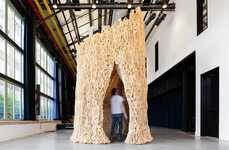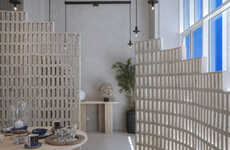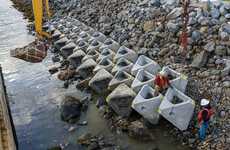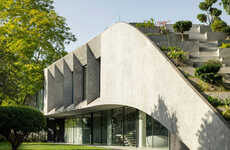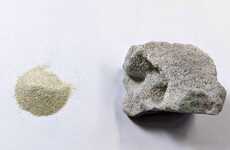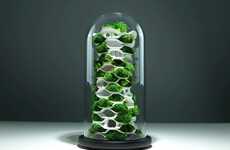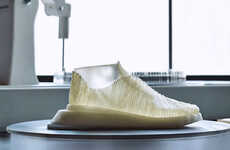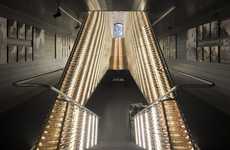
Biological Concrete is Designed to Encourage the Growth of Greenery
Michael Hines — December 26, 2012 — Eco
Vertical gardens in certain urban areas may become a common sight if Biological Concrete manages to go from concept to reality. The "living" building material was designed by the Structural Technology Group at the Universitat Politècnica de Catalunya in Barcelona, Spain. The Biological Concrete is designed to encourage the growth of fungus, moss, lichens and other non-root-growing greenery.
The concrete is specifically designed to inhibit plant growth. The reason behind this is because plants put down roots, and roots can damage a building. The panels encourage the growth of non-threatening plants by trapping rainwater. After about a year, the aforementioned greenery should begin to grow. Biological Concrete was designed specifically for Mediterranean climates.
The concrete is specifically designed to inhibit plant growth. The reason behind this is because plants put down roots, and roots can damage a building. The panels encourage the growth of non-threatening plants by trapping rainwater. After about a year, the aforementioned greenery should begin to grow. Biological Concrete was designed specifically for Mediterranean climates.
Trend Themes
1. Living Building Materials - Biological Concrete is a disruptive innovation opportunity that encourages the growth of greenery on buildings, creating vertical gardens in urban areas.
2. Vertical Gardens - The concept of Biological Concrete opens up opportunities for the development of vertical gardens in urban areas, transforming the way we incorporate greenery into our cities.
3. Sustainable Architecture - The use of Biological Concrete as a living building material presents a disruptive innovation opportunity in the field of sustainable architecture, as it promotes the growth of greenery without damaging the structures.
Industry Implications
1. Construction - The construction industry can benefit from the development and implementation of Biological Concrete, as it offers a new approach to building materials with environmental benefits.
2. Urban Planning - Urban planners and architects can explore the use of Biological Concrete to create more sustainable and eco-friendly cities by incorporating vertical gardens into building designs.
3. Environmental Technology - Biological Concrete represents a disruptive innovation opportunity in the environmental technology industry, as it promotes the growth of greenery and contributes to the mitigation of urban heat island effects.
4.1
Score
Popularity
Activity
Freshness

